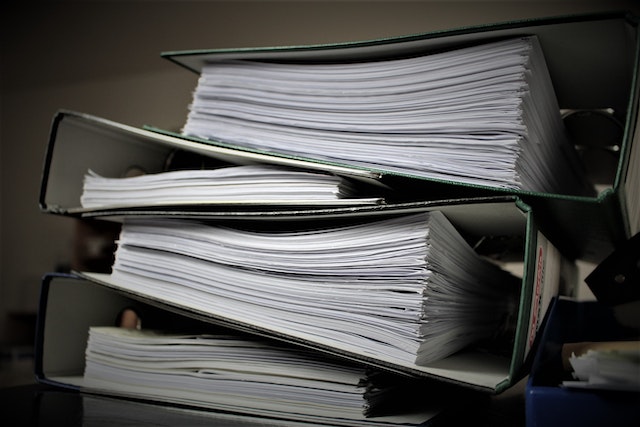You are legally required to keep records of all transactions relating to your tax and superannuation affairs as you start, run, sell, change or close your business, specifically:
- any documents related to your business’s income and expenses
- any documents containing details of any election, choice, estimate, determination or calculation you make for your business’s tax and super affairs, including how (basis or method) the estimate, determination or calculation was made.
To meet your record-keeping requirements and avoid common errors, ensure you understand what records are needed for your business and make accurate and complete record-keeping practices a part of your daily business activities. As your business changes or grows, you may need to review what records you need to keep.
There can be legal and financial consequences if your business doesn’t comply with these record-keeping requirements.
On this page:
If you aren’t sure how this information applies to your situation, ask your registered tax or BAS agent, or contact us for help. We will help you get back on track if you make an error.
What is a record?
A record explains the tax and super-related transactions conducted by your business.
The record needs to contain enough information for us to determine the essential features or purpose of the transactions, so we can understand the relevance of the transactions to your business’s income and expenses.
The minimum information that needs to be on the record is generally the:
- date, amount, and character (for example, sale, purchase, wages, rental) and the relevant GST information for the transaction
- purpose of transaction
- relationships between parties to the transactions, if relevant.
Five rules for record keeping
These five record-keeping rules apply to most records your business is required to keep to meet your tax, super and employer obligations. These are based on law and ATO view:
- You need to keep all records related to starting, running, changing, and selling or closing your business that are relevant to your tax and super affairs.
- If your expenses relate to business use and personal use, make sure you have clear documents to show the business portion.
- The relevant information in your records must not be changed (for example, by using electronic sales suppression tools) and must be stored in a way that protects the information from being changed or the record from being damaged.
- We may ask you to show us you have appropriate safeguards in place.
- You need to be able to reconstruct your original data if your record-keeping system changes over time.
- You need to keep most records for five years.
- Generally, the five-year retention period for each record starts from when you prepared or obtained the record, or completed the transactions or acts those records relate to, whichever is later. However, in some situations, the law states that the start of the five-year retention period is different. For example, for
- fringe benefits tax (FBT) records the five years starts from the date you lodge your fringe benefit tax (FBT) return
- records for super contributions for employees, the five years starts from the date of the contribution
- records for super fund choice for your employees, the five years starts from the date of employee engagement or when an employee is offered, chooses or changes their choice of fund.
- There are also situations where you need to keep some records for longer than five years, including covering the period of review for an assessment that uses information from that record.
- You need to keep all information about any routine procedures you have for destroying digital records.
- Generally, the five-year retention period for each record starts from when you prepared or obtained the record, or completed the transactions or acts those records relate to, whichever is later. However, in some situations, the law states that the start of the five-year retention period is different. For example, for
- You need to be able to show us your records if we ask for them.
- Make sure you keep information about your record-keeping system so we can check that it meets the record-keeping requirements.
- Make sure that the information on the record includes the relevant details to meet your tax, super and employer obligations.
- If you store your data and records digitally
- using an encryption system – provide encryption keys and information about how to access the data when asked. You also need to ensure we can extract and convert your data into a standard data format (for example, Excel or CSV).
- using passwords to protect your records – provide information about how to access them
- ensure your data and records are identifiable, labelled or indexed as you store it. We may need to extract it and use an indexing or text-search system to look at it.
- Your records must be in English or able to be easily converted to English.
See also:
- ITAA 1936 section 262A Keeping of records
- TR 96/7 Income tax: record keeping – section 262A – general principles
- TR 2018/2 Income tax: record keeping and access – electronic records
- PSLA 2008/14 Record Keeping when using commercial off the shelf software
We recommend you also check your record-keeping requirements with all organisations you deal with. For example, the Australian Securities & Investments Commission (ASIC) requires companies to keep records for seven years.
Benefits of keeping accurate and complete records
When we see businesses doing well, one reason is that they have accurate and complete records.
Accurate and complete records allow you to:
- monitor the health of your business and know whether your business is running at a profit or loss
- make sound business decisions
- keep track of money you owe and money owed to you
- monitor your cash flow to help you to make payments on time
- avoid penalties which may apply for failing to keep records
- demonstrate your financial position to lenders, businesses, tax professionals and prospective buyers
- more easily meet your tax, super and employer obligations, including preparing and lodging your returns, BAS, and taxable payments annual report (if you are a business that is required to)
- provide the information we need if we audit your business, making the process easier and shorter.
Find out about:





